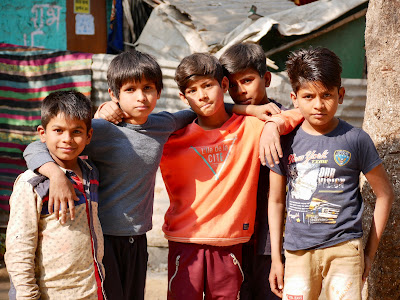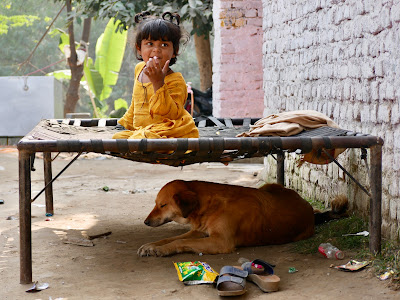The narrow alleys of Majnu Ka Tila in Delhi are full of businesses catering to the long established Tibetan refugee community. Both local and foreign tourists come to visit the Buddhist monastery and to eat in the many Tibetan, Korean and north-east Indian restaurants. A short distance from here, there is a group of less-well known refugees. The Sri Ram colony is home to Hindus who fled Pakistan, not during Partition, but in 2010.
I came upon the colony by chance when visiting a neighbouring Akhada, where traditional Indian wrestling is practised. As I left I noticed an alley leading into a cluster of buildings resembling a village. I went in and although the residents were at first surprised to see a foreigner, they were welcoming and community leader Rajesh Solanki was sent for. He looked to be in early middle-age and wore the brown kurtha-pyjama typical of rural Sindh in Pakistan. He explained that the people living here had come on a religious pilgrimage in 2010, and then refused to leave. They cited discrimination and religious intolerance in Pakistan, as their reasons for wanting to remain in India, and staged demonstrations at Delhi's Jantar Mantar to draw attention to their plight.
The Colony is a hotchpotch of solid, brick buildings owned by better-off families and less permanent structures consisting of metal sheets, tarpaulins and twigs. All of the homes have been built by the residents themselves. Several are unfinished, as many residents lack the resources to complete them. Despite this, there is evidence of ongoing construction and a group of women were laying down a courtyard outside their house. Most homes lack electricity or running water and toilet provision consists of communal male and female blocks. As the colony stands on the floodplain of the Yamuna River, there is a risk of flooding during the monsoon. There are also potential health hazards from mosquitos and from sewage regularly pumped into the river.
Some of the more entrepreneurial residents have established small shops selling snacks and sweets. Some of the houses have small shrines attached to them. These are referred to by the residents as "temples". There are displays of religious piety throughout the colony. The Hindu greeting "Ram Ram" is given in preference to the more secular "namaste" and symbols and pictures of various deities are displayed on the exterior of the buildings. Even the name of the colony is that of Ram Ji, the central character of the Hindu epic, The Ramayana.
 |
| Chander's Hanuman temple |
"The landowner refused to pay us the agreed amount. We had barely enough to live on"
Badal is 39 and from the Kotri district of Sindh. Solanki asked him to show me around and answer my questions. I asked what had caused him to leave the place where he was born and to remain in India. He said" I owned eight acres of land in Pakistan. It was not enough to support my family and I entered into agreements with a larger landowner. The contract said that we would share the expenses of seeds, fertiliser and other items 50/50 with the landlord, and that we would also share any profits in the same way. We paid our share of expenses but when there was a good profit, he refused to pay us. We had barely enough to live on". Badal also lost his eight acres of land when they were seized by local gangsters. "There were too many of them for us to resist" he said "they were armed and had friends amongst the politicians. No-one would help us".
He used to sell telephone covers and other accessories, but now has insufficient funds to buy stock. He works occasionally as a day labourer but this pays little and is unreliable. His home is in very poor condition - only partially built - and all eight residents sleep in one small room. The situation was made worse by the death of one of his five children at the age of 20, leaving behind a widow and a small child, now being cared for by Badal and his wife. Despite this, he says he feels safer in India and is happier there.
 |
| Badal |
"There was no violence, no threats, but the pressure to convert was always there, every day, in every conversation"
One of Badal's neighbours, Chander, also from Kotri district, tells a similar story. He owned no land in Pakistan and worked as an agricultural labourer to support his family. Again, the landlord refused to pay the contract share and Chander felt he had nowhere to turn for help. The colony's overt religiosity made me curious about faith-based discrimination, or pressure to convert in Pakistan. Chander said, "There was no violence, no threats, but the pressure to convert was always there, every day, in every conversation. Even in the market. People we thought of as friends would say to us 'why don't you convert? Things would be better for you' ". Chander also has problems in India. He showed me the small Hanuman temple he built at the side of his house. It is collapsing as the land subsides, possibly caused by the sewage being pumped into the Jamuna River just a few metres from his home. "I can't afford to repair this and I'm worried the house will collapse too" he said.
Two of the women residents told similar stories about pressure to convert. Janaki sat playing with two of her grand-children whilst she prepared a chick-pea dish for their lunch. "They would always talk about converting" she said. Janaki lives in one of the better quality houses. She still has family in Pakistan. Megha, perhaps in her sixties, stood outside her house, cuddling one of her granddaughters. She has ten children of her own - five in India and five in her home town, Mirfazal Pakistan. She was worried about her daughter-in-law. "She had an accident six months ago and is still in ICU in the government hospital. They won't let me see her. I want to give her soup and nurse her back to health" she said.
 |
| Janaki and her grand-children |
 |
| Megha and one of her ten grand-children |
"...my assistant often has to go from door to door and bring the children here herself"
Most of the children go to school outside, but there is some teaching goes on inside the colony. A single, windowless room is used for pre-school learning. When I visited, the children were enjoying snacks. I'd seen food provided in a village school in West Bengal, as a way of encouraging attendance. I asked the teacher if this was the case here. "Yes" she said "It's to encourage them to come. Not all of the parents are committed to pre-school learning, and my assistant often has to go from door to door and bring the children here herself". Resources appeared limited but she spoke enthusiastically and was clearly committed to delivering the best for the children. The teacher's and assistant's salaries are paid from Central Government funds allocated to supporting the welfare of women and children.
The older children have access to additional learning in a community hall built with funds from overseas donations. Teaching is provided by NGOs and volunteer university students. The room was clean and tidy. Charts with tricky algebraic formulations and maps of India and the world were displayed on the walls. There was also a row of sewing machines, provided by a charitable organisation and used for teaching tailoring skills. Although not a formal school, many of the children come here for tuition. I asked some of them what their favourite lessons were. Jalram, aged 11 said, in English, "I like mathematics and Hindi". Others gave maths as their favourite subject while one said "English". Some of them gathered around the maps, locating different cities and countries.
More than a decade after their arrival, the situation of the Sri Ram residents remains uncertain. Solanki said "We are hopeful that the new law to assist victims of religious persecution will help us". He refers to the 2019 Citizenship (Amendment) Act that provided routes to Indian Citizenship for persecuted religious minorities from Afghanistan, Bangladesh and Pakistan. Hindus, Sikhs, Buddhists, Jains, Christians and Parsis who arrived in India before December 2014 are eligible for consideration under the Act. Muslims are not included in its provisions. The application of a religious test resulted in sometimes violent demonstrations in various parts of India.
Despite their troubles, many of the people I met spoke about feeling happier in India than they had in Pakistan, and no-one expressed regret at having left. There may yet be a brighter future for Jalram, his friends and their families.
 |
| Jalram (hiding) and friends |
 |
| Where did my dog go? |
 |
| Some of the residents have opened small shops |

No comments:
Post a Comment